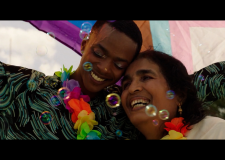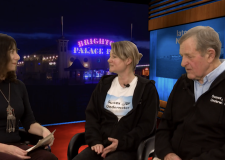Words to the wise from a Brighton and Hove parent
Pippa Hodge examines the complex issue of the language surrounding disability and how we can educate people to choose their words more wisely.
Imagine there was a Language Sensitivity Spectrum drawn as a line from cool blue to red hot. At the blue end sit those of us who think it doesn’t really matter how a disability or a condition is described. And at the reactive red end sit those of us who are often very uncomfortable with the words and terms used by professionals, friends, family or passers-by.
My son has Down’s syndrome – he was born with an extra chromosome.
The medical term for this is Trisomy 21. He is not a Down’s Boy or a Special Needs Kid. And he is definitely NOT a Retard (grrr).
First and foremost, he is Leo. I think you can already sense which end of the Language Spectrum you’ll find me.
Also, language shifts like fashion. Whatever terms we decide to own for ourselves and for our young people get hijacked. Before you know it you’re hearing them being bandied disrespectfully around the playground or office in pursuit of a cheap laugh or to cause humiliation.
I made a private promise to myself at the beginning of 2014 to step up to inappropriate language if I felt that it marginalised my son or threatened to make his “rightful space” smaller.
It’s been an interesting year! I quietly explained to a close friend why making a loud public joke about “being in the special needs corner” was an unhelpful throwback to darker times.
Let’s just say it was an “Ouch!” moment and it’s left a small but definite crack in the friendship. But I knew that it mattered and I don’t regret it.
I have also had several conversations this year with friendly people from older generations where the common terms were different and where “truisms” around certain conditions were the norm – “Downs children are such happy souls” or “Poor Boy, wheelchair-bound”, etc.
On these occasions, I’ve chatted and gently explained that the language is a bit different these days. And that since “community” is really important, I’d hate their friendliness to be rebuffed because of a language misfit.
I think this is a key point – it’s all about the intent behind the words. If the intent is genuine and the words have just “missed”, then you can take a calm breath, step in, and offer your perspective.
It’s helpful to repeat the phrase that works best for you. I might say, for example, “We went to a great picnic with local families who all have a child with T21.”
Hearing a phrase to imitate can be a great relief to people who might worry they are being offensive but don’t know how to ask for guidance without being more offensive still.
Some parent carers print up simple cards that explain their child’s condition and give an internet source for further info and quietly hand that out. Whatever works for you.
I’d like to stress that I’m not trying to start a revolution here – none of us have had enough sleep for that!
And of course there are times when I let comments go by because I’m too tired or too wobbly to engage or the moment isn’t right.
But I see no reason why we can’t help tweak the language and terms of reference used toward and around our children.
By using “person-centred” language we can help create a positive sense of identity for our child and their siblings, family and friends.
This article first appeared in the current edition of Out of Amaze, the newsletter published by the Brighton and Hove charity and support group Amaze.
….
Amaze is changing its language too
Here at Amaze, we’ve been debating the use of the term “special needs” for a while now. As Pippa points out, though it might have been considered the most cherishing, empowering term a decade ago, meanings have a tricky habit of changing and these days you are just as likely to hear “special” used in an ironic or downright derogatory way in relation to disability.
We want to make sure that the language we use reflects both the prevailing terminology used by government and services and the terms our parents are happiest with.
For this reason we have changed our “byline” to “Working with parents of children and young people with special educational needs and disability (SEND)”.
We will also gradually replace the use of “special needs” with “additional needs” throughout our literature to reflect a growing desire for recognition that our kids are kids like any other – they just need extra support.





















